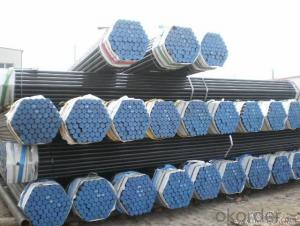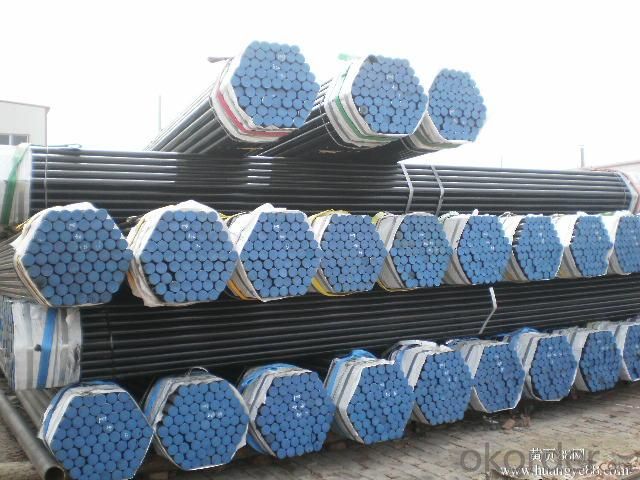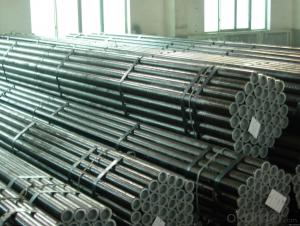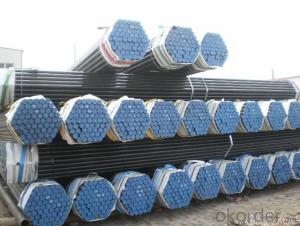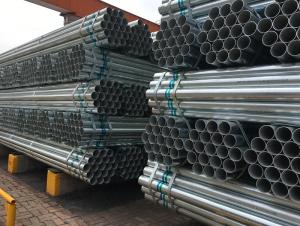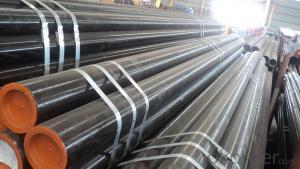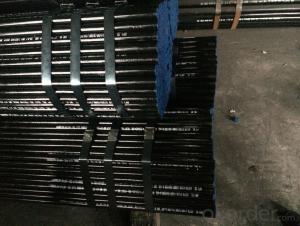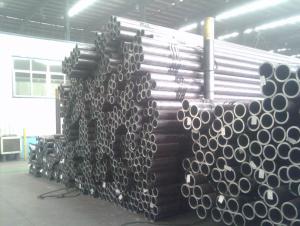Steel Linepipe 5CT gas water oil steel pipe linepipe
- Loading Port:
- Tianjin
- Payment Terms:
- TT OR LC
- Min Order Qty:
- 27 m.t.
- Supply Capability:
- 8000 m.t./month
OKorder Service Pledge
OKorder Financial Service
You Might Also Like
1、Structure of Steel Linepipe 5L :
Steel Linepipe 5L is to be used for conveying gas, water, and petroleum foroil and natural gas industries. And used for structural steel pies purpose. As the manufacturing process does not include any welding, seamless pipes are perceived to be stronger and more reliable. Historically seamless pipe was regarded as withstanding pressure better than other types, and was often more easily available than welded pipe.
2、Main Features of Steel Linepipe 5L :
• High manufacturing accuracy
• High strength
• Small inertia resistance
• Strong heat dissipation ability
• Good visual effect
• Reasonable price
3、Steel Linepipe 5L : Specification:
Standard | GB, DIN, ASTM ASTM A106-2006, ASTM A53-2007 |
Grade | 10#-45#, 16Mn 10#, 20#, 45#, 16Mn |
Thickness | 8 - 33 mm |
Section Shape | Round |
Outer Diameter | 133 - 219 mm |
Place of Origin | Shandong, China (Mainland) |
Secondary Or Not | Non-secondary |
Application | Hydraulic Pipe |
Technique | Cold Drawn |
Certification | API |
Surface Treatment | factory state or painted black |
Special Pipe | API Pipe |
Alloy Or Not | Non-alloy |
Length | 5-12M |
Outer Diameter | 21.3-610mm |
Grade | 20#, 45#, Q345, API J55, API K55, API L80, API N80, API P110, A53B |
Standard | ASME, ASTM |
1) Material:20#(ASTM A 106/A53 GRB.API5LGRB,GB),45#,16Mn,10#.
2) Specification range:OD:21.3-610mm,WT:6-70mm,length:6-12m or according to the requirement of clients.
3) Excutive standards:GB,ASME API5L.ASTM A 106/A53,Despite of the above standards,we can also supply seamless steel pipe with standard of DIN,JIS,and so on,and also develop new products according to the requirements of our clients!
4) Surface:black lacquered,varnish coating or galvanized.
5) Ends:Beveled or square cut,plastic capped,painted.
6) Packing:bundles wrapped with strong steel strip,seaworthy packing.
4、Packaging & Delivery
Packaging Details: | seaworthy package,bundles wrapped with strong steel strip |
Delivery Detail: | 15-30days after received 30%TT |
5、FAQ of Steel Linepipe 5L :
①How is the quality of your products?
Our products are manufactured strictly according to national and internaional standard, and we take a test
on every pipe before delivered out. If you want see our quality certifications and all kinds of testing report, please just ask us for it.
Guaranteed: If products’ quality don’t accord to discription as we give or the promise before you place order, we promise 100% refund.
②How about price?
Yes, we are factory and be able to give you lowest price below market one, and we have a policy that “ for saving time and absolutely honest business attitude, we quote as lowest as possible for any customer, and discount can be given according to quantity”,if you like bargain and factory price is not low enough as you think, just don’t waste your time.Please trust the quotation we would give you, it is professional one.
③Why should you chose us?
Chose happens because of quality, then price, We can give you both.Additionally, we can also offer professional products inquiry, products knowledge train(for agents), smooth goods delivery, exellent customer solution proposals.Our service formula: good quality+good price+good service=customer’s trust
SGS test is available, customer inspection before shipping is welcome, third party inspection is no problem.
6、 Steel Linepipe 5L : Images:
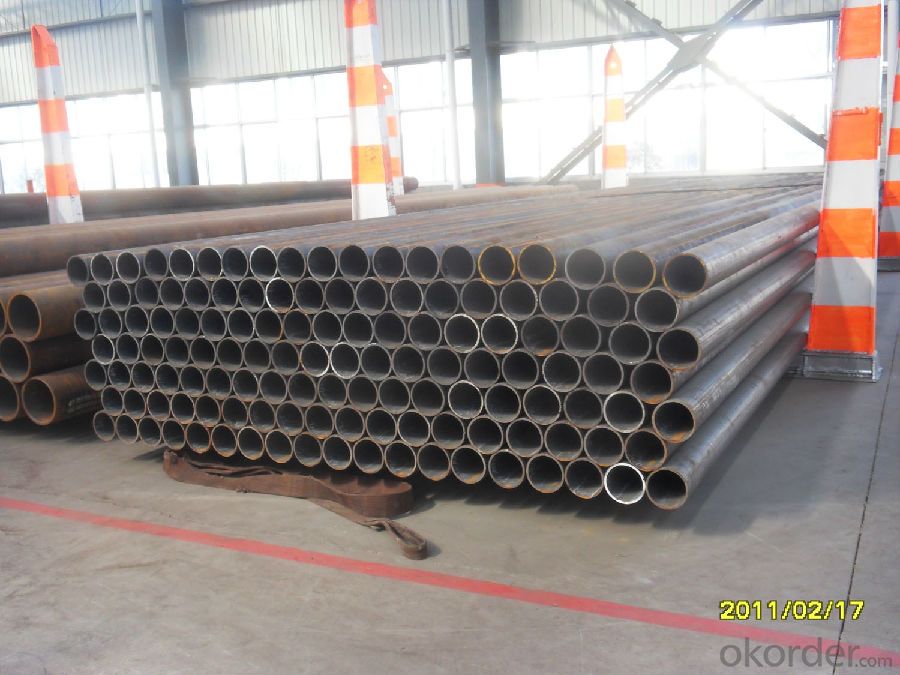
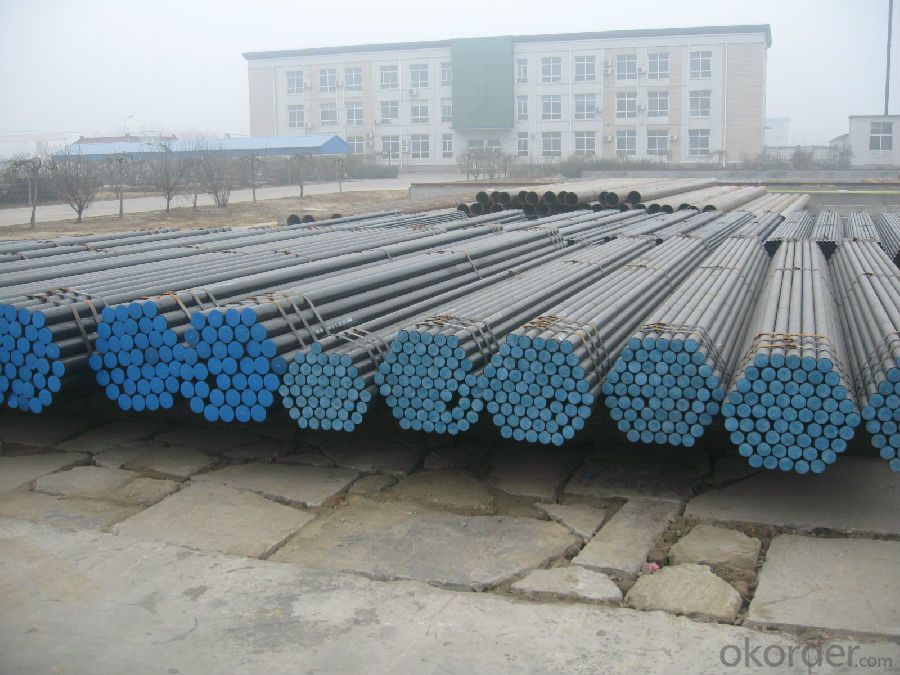
- Q: What is the difference between nominal and actual pipe size?
- The nominal pipe size refers to the approximate size of a pipe based on its interior diameter, while the actual pipe size refers to the precise measurement of the interior diameter.
- Q: Difference between cold rolled steel pipe and common steel pipe
- 1, from the dimension accuracy above, cold-rolled steel pipe size is good, high precision2. from the outward appearance, the surface of cold-rolled steel pipe is bright, and the surface of hot rolled steel pipe has obvious oxide skin or red rust
- Q: What is the maximum allowable stress for steel pipes?
- The maximum allowable stress for steel pipes depends on various factors such as the grade of steel, diameter, wall thickness, and the intended application. It is typically determined by industry standards and codes, such as the American Society of Mechanical Engineers (ASME) Boiler and Pressure Vessel Code. Therefore, there is no one-size-fits-all answer to this question.
- Q: Are steel pipes suitable for wastewater treatment plants?
- Yes, steel pipes are suitable for wastewater treatment plants. Steel pipes are commonly used in wastewater treatment plants due to their high strength and durability. They can withstand high pressure and are resistant to corrosion, making them ideal for carrying wastewater and other fluids in the harsh conditions found in treatment plants. Additionally, steel pipes can be easily welded and joined, allowing for flexibility in the design and installation of the piping system. Overall, steel pipes are a reliable and cost-effective choice for wastewater treatment plants.
- Q: How are steel pipes used in the manufacturing of railways?
- The manufacturing of railways involves the versatile use of steel pipes. In the context of railway construction, steel pipes serve as a fundamental component for the creation of rail tracks. These pipes are joined together through welding to form robust and lengthy tracks capable of withstanding the weight and pressure exerted by passing trains. Moreover, steel pipes find application in the manufacturing of railway bridges and tunnels. These structures necessitate the utilization of strong and resilient materials in order to guarantee the safety and stability of the railway system. Steel pipes are frequently employed in the construction of supporting structures and piers that uphold the bridges. Additionally, they provide structural support and stability for tunnels. Furthermore, steel pipes contribute to the production of various railway components and equipment. For instance, they are used in the fabrication of railway signaling systems responsible for managing train movement and ensuring safety. These pipes are commonly utilized to encase and safeguard the electrical wiring and other components of the signaling systems. In addition, steel pipes play a significant role in the manufacturing of railway carriages and locomotives. They serve as the framework and structure of the train, imparting strength and stability. Furthermore, steel pipes are utilized for diverse purposes such as creating air conditioning systems, brake systems, and fuel delivery systems within the train. Overall, steel pipes occupy a pivotal position in the manufacturing of railways. They are indispensable for the construction of rail tracks, bridges, tunnels, and a variety of railway components and equipment. The strength and durability of steel make it an ideal material for ensuring the safety and efficiency of railway systems.
- Q: How are steel pipes used in the manufacturing of agricultural machinery?
- Steel pipes are commonly used in the manufacturing of agricultural machinery for various purposes such as structural support, fluid transportation, and hydraulic systems. They provide durability and strength to the machinery, allowing it to withstand the heavy loads and harsh conditions associated with agricultural activities. Additionally, steel pipes are often used to create the framework and chassis of the machinery, ensuring its stability and longevity in the field.
- Q: How are steel pipes classified based on their end connections?
- Steel pipes can be classified based on their end connections into three main categories: threaded, flanged, and welded. Threaded pipes have screw threads on the ends, allowing for easy assembly and disassembly. Flanged pipes have flanges on the ends, which are flat surfaces that can be bolted together, providing a strong connection. Welded pipes have their ends welded together, creating a permanent and secure joint.
- Q: Is the electric pipe used with steel pipe or PVC pipe?
- Electric pipe laying is generally divided into the following circumstances:1) the explosion-proof area must be galvanized steel pipe and explosion proof flexible pipe (used for front end equipment connection);2) non explosion-proof area can use KBG pipe or PVC tube, the former is higher cost, but the installation is firm, the latter is low cost, easy to construction, and in the rain where it will not rust, but compared to the KBG pipe may be damaged.
- Q: How are steel pipes used in heating systems?
- Steel pipes are commonly used in heating systems as they have excellent durability and heat resistance properties. These pipes are typically used to transport hot water or steam from a heating source, such as a boiler, to various parts of a building, including radiators or baseboard heaters. They are also used for circulating cooled water back to the heating source for reheating. The high strength and corrosion-resistant nature of steel pipes make them ideal for handling the high temperatures and pressures involved in heating systems, ensuring efficient heat transfer and long-lasting performance.
- Q: Is the diameter of the steel tube indicated by the outer diameter by the wall thickness or by the inside diameter by the wall thickness?
- Seamless steel pipe specifications are: outer diameter, wall thickness, material. Three of these reflect its main features.Welding pipe specifications are: nominal diameter (internal diameter), galvanized or non plated
Send your message to us
Steel Linepipe 5CT gas water oil steel pipe linepipe
- Loading Port:
- Tianjin
- Payment Terms:
- TT OR LC
- Min Order Qty:
- 27 m.t.
- Supply Capability:
- 8000 m.t./month
OKorder Service Pledge
OKorder Financial Service
Similar products
Hot products
Hot Searches
Related keywords
